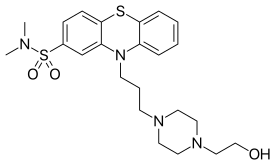Pipotiazine
Pipotiazine (Piportil), also known as pipothiazine, is a typical antipsychotic of the phenothiazine class[1] used in the United Kingdom and other countries for the treatment of schizophrenia.[2] Its properties are similar to those of chlorpromazine. A 2004 systematic review investigated its efficacy for people with schizophrenia:
| Summary | ||||||||||||||||||||||||||||||||||||
|---|---|---|---|---|---|---|---|---|---|---|---|---|---|---|---|---|---|---|---|---|---|---|---|---|---|---|---|---|---|---|---|---|---|---|---|---|
| Although well-conducted and reported randomized trials are still needed to fully inform practice (no trial data exists reporting hospital and services outcomes, quality of life, satisfaction with care and economics) pipotiazine palmitate is a viable choice for both clinician and person with schizophrenia.[3] | ||||||||||||||||||||||||||||||||||||
| ||||||||||||||||||||||||||||||||||||
 | |
| Clinical data | |
|---|---|
| Trade names | Piportil |
| AHFS/Drugs.com | International Drug Names |
| Routes of administration | Oral, IM |
| ATC code | |
| Legal status | |
| Legal status |
|
| Identifiers | |
IUPAC name
| |
| CAS Number | |
| PubChem CID | |
| IUPHAR/BPS | |
| DrugBank | |
| ChemSpider | |
| UNII | |
| KEGG | |
| ChEMBL | |
| CompTox Dashboard (EPA) | |
| ECHA InfoCard | 100.049.672 |
| Chemical and physical data | |
| Formula | C24H33N3O3S2 |
| Molar mass | 475.67 g/mol g·mol−1 |
| 3D model (JSmol) | |
SMILES
| |
See also
- Typical antipsychotic
- Phenothiazine
References
- Bechelli, L. P.; Ruffino-Netto, A.; Hetem, G. (1983). "A double-blind controlled trial of pipotiazine, haloperidol and placebo in recently-hospitalized acute schizophrenic patients". Brazilian Journal of Medical and Biological Research. 16 (4): 305–311. PMID 6143579.
- International Drug Names
- Dinesh, M; David, A; Quraishi, S (2004). "Depot pipotiazine palmitate and undecylenate for schizophrenia". Cochrane Database of Systematic Reviews. 3: CD001720.pub2. doi:10.1002/14651858.CD001720.pub2.
| Typical |
|
|---|---|
| Disputed | |
| Atypical |
|
| Others | |
| |
| Classes |
|
|---|---|
| Antidepressants (TCAs and TeCAs) |
|
| Antihistamines |
|
| Antipsychotics |
|
| Anticonvulsants | |
| Others |
|
This article is issued from
Wikipedia.
The text is licensed under Creative
Commons - Attribution - Sharealike.
Additional terms may apply for the media files.